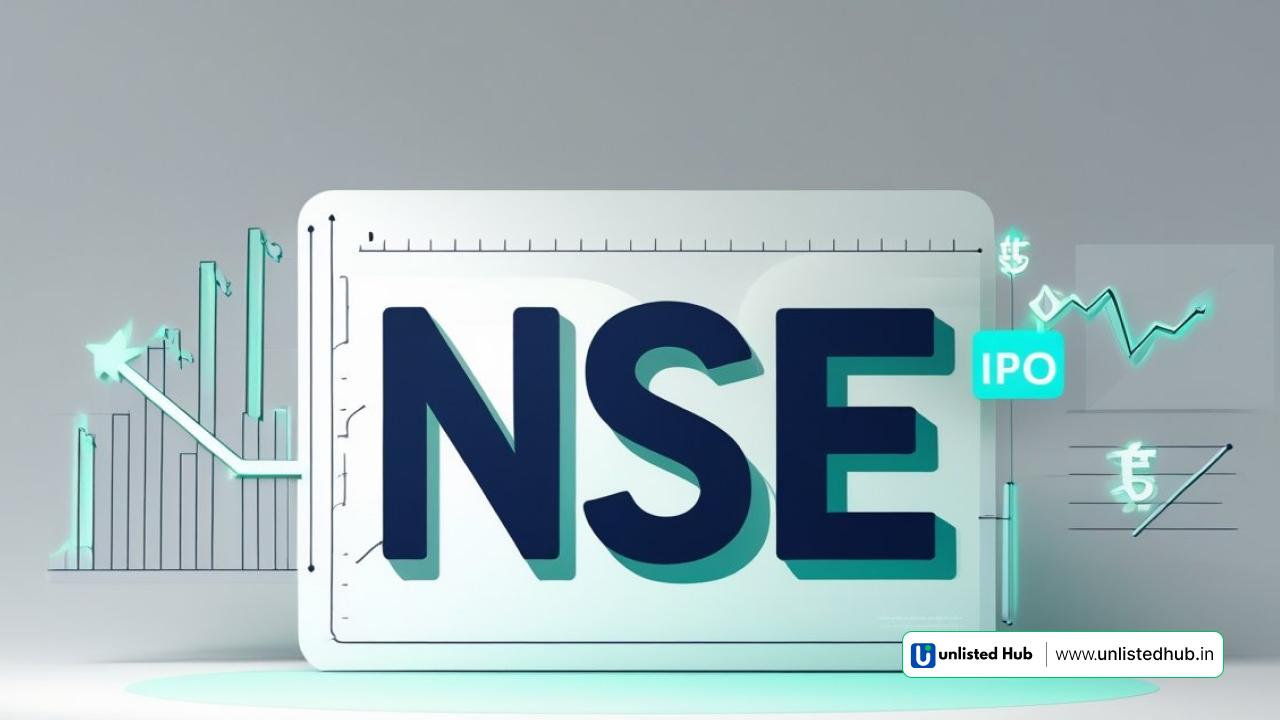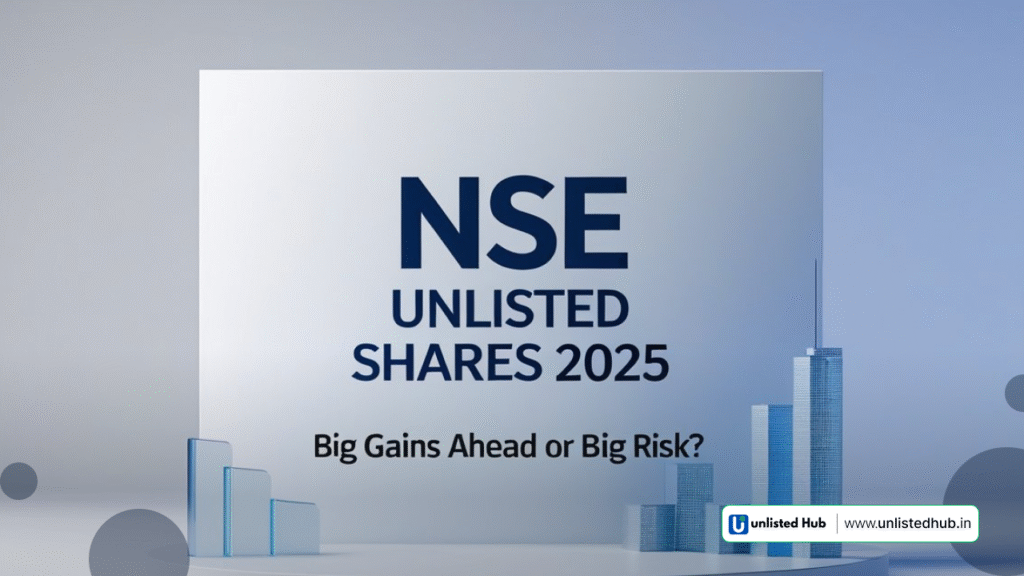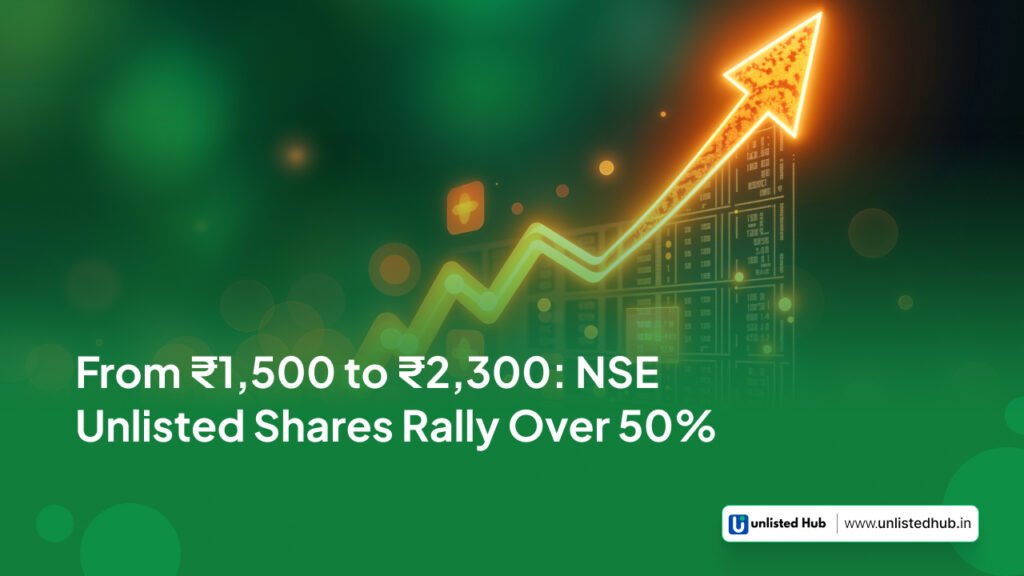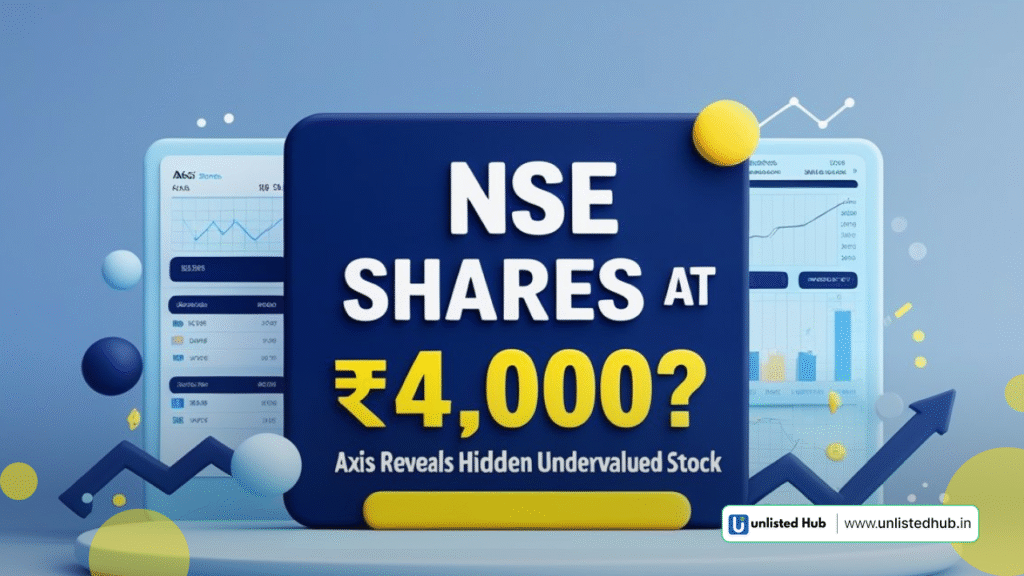Introduction: The Buzz Around NSE Unlisted Shares
The growing interest in NSE unlisted shares is hard to ignore. As India’s largest stock exchange moves closer to its IPO, early investors are exploring ways to tap into its potential ahead of the public listing. These shares are not traded on regular stock exchanges but are available in the unlisted market, offering a rare opportunity to invest in a blue-chip company before it goes public.
NSE unlisted shares have caught the eye of both retail and institutional investors due to the company’s solid performance, high profitability, and dominant market position. Buying early gives investors a chance to benefit from valuation gains once the IPO hits the market.
Investing in NSE unlisted shares demands thorough due diligence and the use of a reliable platform, unlike traditional listed stocks. However, the rewards could be significant for those who get in early. Exploring NSE unlisted shares now could be a smart move in today’s evolving investment landscape.
A) What Are Unlisted Shares and Why Is NSE in Focus?
Unlisted shares refer to the equity of companies that are not available for trading on major stock exchanges such as the NSE or BSE. These shares are typically bought and sold in the private equity market or through unlisted share brokers. While they are not available for regular retail trading, unlisted shares can offer high-growth investment opportunities, especially in companies that are heading towards an IPO.
In NSE have emerged as a major talking point in 2025 among investors exploring off-market equity opportunities. The National Stock Exchange (NSE) is India’s largest stock exchange, but its equity has not yet been listed publicly. This has drawn huge interest from HNIs and retail investors looking to gain early access before its expected IPO.
Why Are NSE Unlisted Shares in Focus?
There are several reasons why NSE unlisted shares are currently under the spotlight:
Impressive Financials: NSE reports strong profits and consistent growth.
IPO Buzz: With NSE planning for a potential IPO, investors expect listing gains.
Limited Supply: The scarcity of NSE unlisted shares increases their demand.
Trusted by millions: NSE has established itself as a cornerstone of India’s financial landscape.
SEBI Reforms: Regulatory clarity around unlisted shares is boosting investor confidence.
Investing in NSE could provide a strategic edge to those seeking pre-IPO exposure. However, due diligence is crucial as risks like liquidity and pricing inconsistencies exist.
As NSE prepares for its much-anticipated listing, NSE unlisted shares could serve as a gateway to participate in the growth story of one of India’s most valuable financial institutions.

B) NSE Financials Snapshot: Strong Foundation or Overhype?
As India’s premier stock exchange, the National Stock Exchange (NSE) plays a central role in the country’s capital markets. However, while millions trade on it daily, NSE itself remains an unlisted company, sparking investor interest in NSE unlisted shares.
With IPO buzz growing louder in 2025, investors are scrutinizing NSE’s financials to determine whether its valuation is built on a strong foundation or overhyped expectations.
Why Investors Are Looking Closely
NSE unlisted shares have gradually gained value over time, reflecting growing investor confidence and strong business fundamentals. This surge is largely due to NSE’s consistent financial growth, diversified revenue streams, and dominant market position. Yet, some experts warn that the pricing of NSE in the grey market might be running ahead of fundamentals.
Let’s take a closer look.
NSE Financial Snapshot (FY 2024)
| Financial Metric | Value (Approx.) | YoY Growth |
| Revenue | ₹10,250 Cr | 14% |
| Net Profit | ₹5,380 Cr | 11% |
| EBITDA Margin | 70%+ | Stable |
| ROE (Return on Equity) | 45% | Strong |
| EPS (Earnings per Share) | ₹110+ | Solid |
Real Strength or Just Hype?
The above numbers reflect a strong financial base. NSE’s high margins, steady profits, and superior return ratios are rare even among listed blue-chip companies. These factors contribute to the growing demand for NSE, especially among investors seeking pre-IPO exposure.
However, as demand for NSE rises, prices have soared in the unlisted market, leading some analysts to question whether valuations are peaking before the IPO. Limited visibility and difficulty in exiting positions make these investments riskier for potential buyers.
C) Why Are NSE Unlisted Share Prices Going Up?
Lately, NSE have gained significant attention among investors exploring high-potential opportunities in the off-market space. With increasing investor demand and the anticipation of a blockbuster IPO, the price of NSE has seen a noticeable surge. But what exactly is fueling this upward momentum?
1. Strong Financial Performance
NSE, as India’s leading stock exchange, has consistently posted strong revenues and profits. With high EBITDA margins, a stable growth rate, and rising net profit figures, many investors see NSE unlisted as a reliable long-term bet.
2. Upcoming IPO Buzz
The biggest factor driving the rise in demand is the expected NSE IPO. Investors believe that getting in early through NSE could offer solid listing gains, similar to what was seen in earlier IPOs of high-profile companies.
3. Market Monopoly
NSE holds a dominant position in India’s equity derivatives and cash market. Its near-monopoly status gives investors confidence in the future growth potential of the company.
4. Limited Supply in Grey Market
Since NSE are not available on regular exchanges, supply is limited. This scarcity drives up the premium in the unlisted market, especially when buyer interest surges.
5. Regulatory Confidence
With SEBI bringing in more structure and regulation around unlisted securities, investors now feel more secure dealing in NSE unlisted, boosting their appeal.
Key Reasons for Price Surge
| Factor | Impact on Price |
| Strong financials | Builds investor trust |
| IPO expectations | Increases pre-listing demand |
| Limited share availability | Drives up premium in grey market |
| NSE’s dominant market position | Suggests long-term growth potential |
| SEBI reforms | Boosts regulatory confidence |
D) NSE IPO 2025: What We Know So Far
The highly anticipated NSE IPO 2025 is capturing major attention across India’s financial markets. As India’s leading stock exchange, the National Stock Exchange (NSE) going public is one of the biggest events for investors this year. While the NSE is the backbone of equity trading in India, it has remained privately held for years. This has made NSE unlisted highly attractive to those looking to invest early before the official listing.
What’s Driving the Hype?
There are several reasons why NSE are in high demand ahead of the IPO. The company has reported consistent profits, holds a dominant market position, and benefits from growing participation in India’s capital markets. The upcoming IPO is further boosting investor interest and driving excitement around the stock.
NSE IPO: Key Things We Know
| Feature | Details |
| Expected Listing Year | 2025 |
| Industry | Stock Exchange / Financial Services |
| Market Position | India’s Largest Stock Exchange |
| Profitability | Consistently Profitable |
| IPO Status | SEBI Filing Expected |
| Investor Buzz | Extremely High |
Should You Invest in NSE Unlisted Shares Before the IPO?
For investors seeking early entry before the IPO, investing in NSE could be a strategic opportunity. If the company lists at a higher valuation, early buyers may enjoy strong listing gains. However, it’s important to understand that unlisted shares carry certain risks, such as low liquidity, pricing volatility, and the possibility of delays in the IPO process.
If you’re planning to invest, always work with trusted unlisted share dealers, verify all documents, and check whether you’re prepared for a possible lock-in period after the listing.
Key Takeaway
The NSE IPO 2025 has opened the door to one of the most promising pre-IPO investment opportunities in India. For those who got in early through NSE, the road to listing could be rewarding, but only with proper due diligence.
E) Should You Invest in NSE Unlisted Shares Now?
As excitement builds around the NSE IPO, a growing number of investors are eyeing NSE as a way to enter early and benefit from potential listing gains. So, is this the ideal moment to consider investing?
Let’s break it down based on key factors: pros and cons, entry price vs listing gain expectations, and liquidity and lock-in concerns.
Pros and Cons of NSE Unlisted Shares
NSE offer several advantages, especially for long-term investors. NSE is India’s largest stock exchange, with solid financials, strong brand value, and regulatory backing. Getting in early gives investors a chance to purchase shares at a comparatively lower valuation ahead of the IPO launch.
However, there are also risks. Unlisted shares have limited liquidity, pricing can vary across dealers, and there’s no guarantee of immediate gains post-listing.
Entry Price vs. Listing Gain Expectations
NSE are presently commanding higher prices in the grey market, driven by strong investor interest. Investors expecting the IPO to bring a strong valuation are hoping for 30–50% listing gains. But entry price matters—a high buying price could reduce post-IPO profits.
Liquidity & Lock-In Issues
Selling unlisted shares isn’t as easy as trading on the stock market. Transactions take time, and after the IPO, there may be a 6-month lock-in period for pre-IPO investors (especially if bought through certain categories).
Quick Comparison Table
| Factor | Details |
| Pros | Early entry, strong company, potential high returns |
| Cons | Low liquidity, price variation, no instant gains |
| Entry Price | ₹3,500–₹4,000 (subject to change) |
| Listing Gain Expectation | 30–50% (market estimate) |
| Lock-In Period After IPO | Up to 6 months (based on investor type) |
Closing Thoughts
NSE offer promising upside, but like any pre-IPO bet, they come with risks. If you’re comfortable with limited liquidity and potential holding periods, this could be a rewarding move—just ensure you’re buying at the right price.
F) Expert Opinion: What Analysts Say About NSE Valuation
With the NSE IPO 2025 approaching, investor curiosity around the company’s valuation is reaching new heights. From institutional analysts to retail investors, everyone is trying to determine whether NSE are priced fairly—or are already overvalued.
So, what do the experts say?
Strong Financial Foundation
Most analysts agree that the National Stock Exchange (NSE) is fundamentally strong. It commands nearly 90% market share in equity derivatives and maintains impressive profit margins. These factors form the base for the rising demand in NSE unlisted shares.
Valuation estimates by various brokerage firms and market research groups place NSE’s total valuation anywhere between ₹1.8 to ₹2.2 lakh crore. This wide range reflects market uncertainty, especially due to the grey market premium on NSE unlisted shares.
Analyst Take: Is It Fairly Valued?
Let’s compare analyst views on NSE’s valuation and how it connects to current unlisted share pricing.
| Analyst Viewpoint | Comment | Implication for NSE Unlisted Shares |
| Conservative Estimate | ₹1.8 lakh crore – solid but cautious | May signal current prices are high |
| Bullish Estimate | ₹2.2 lakh crore – expects strong listing | Justifies current premium in unlisted market |
| IPO Listing Expectation | ₹4,500+ per share potential | Upside still exists if bought at right price |
| Risk Factor Mentioned | Regulatory delays, lock-in post IPO | Buy with a long-term view |
G) How to Invest in NSE Unlisted Shares Safely
As interest in pre-IPO investing grows, many investors are turning their attention to NSE unlisted shares—the equity of India’s top stock exchange that hasn’t yet hit the public markets. While the potential rewards are attractive, it’s important to approach these investments carefully and safely.
Here’s a step-by-step guide to help you invest in NSE unlisted shares with confidence.
Step 1: Understand the Product
To start with, it’s important to understand that NSE are not available for trading on stock exchanges like NSE or BSE. These are private equity shares available in the grey market or through authorized brokers who deal in unlisted stocks.
Step 2: Choose a Trusted Broker or Platform
Always work with SEBI-registered intermediaries or well-known unlisted share platforms. Avoid informal dealers or anyone offering prices that seem “too good to be true.”
Step 3: Verify Pricing and Documentation
Ask for complete transaction details including price per share, payment method, and share transfer process. Pricing for NSE unlisted shares can vary based on market demand, so compare across sources.
Step 4: Check Demat Transfer & Compliance
Make sure the shares are credited straight to your Demat account to secure ownership. A legal agreement or invoice will be shared with you for your records. Check whether there’s a post-IPO lock-in period that could restrict selling your shares.
Step 5: Stay Updated and Monitor SEBI Guidelines
Regulations for unlisted shares are evolving. Always stay informed about changes in SEBI norms regarding taxation, lock-ins, and IPO disclosures for safer investing.
Smart Investing Tip
NSE offer a chance to be part of India’s top exchange before its IPO. But investing smartly—through verified sources and with clear paperwork—can help you avoid costly mistakes.
H) Final Verdict: Timing vs Valuation – What Should Retail Investors Do?
With the NSE IPO expected in 2025, retail investors are facing a common dilemma: Is this the right time to buy NSE unlisted shares, or should I wait for a better price? Both timing and valuation play a key role in making a wise investment decision.
Let’s explore both aspects to understand what retail investors should consider.
The Timing Argument
Many investors believe that buying NSE unlisted shares now gives them an early-mover advantage. The IPO is approaching, and market buzz is strong. For those who enter early and at a reasonable price, there is potential for attractive listing gains.
However, entering too late—when grey market prices have already surged—can reduce the return potential. Timing, therefore, is important, but it must be balanced with smart valuation.
The Valuation Side
Although NSE has solid fundamentals, it’s essential to evaluate if the current pricing of NSE truly reflects its actual worth. Some brokers are quoting ₹4,000 or more per share in the unlisted market. If the IPO valuation doesn’t support that price level, investors may face lower-than-expected returns.
That’s why valuation should never be ignored—even if the IPO date is near.
Timing vs Valuation: Side-by-Side
| Factor | Early Investment | Waiting for Better Valuation |
| IPO Advantage | Possible listing gains if bought lower | May miss early entry |
| Risk Level | Higher if bought at inflated grey prices | Lower if bought post-correction |
| Liquidity | Limited in unlisted market | High post IPO |
| Lock-in Period | May apply depending on how shares are bought | No lock-in post IPO (for public buyers) |
| Ideal For | Aggressive investors | Cautious or long-term investors |
FAQS of NSE Unlisted Shares
Other Investors Are Exploring
NSE share price today || NSE unlisted share price live || NSE unlisted share volume surge || NSE IPO valuation update || NSE Unlisted Shares Brokers || NSE unlisted shares demand 2025 || NSE pre‑IPO investment guide || NSE unlisted shares outlook





